DEFEAT WITH HONOUR – The 1969 Royal Wesley game – A new perspective on a famous game by Eardley Lieversz who was there when it happened
My reason for writing this article is two fold. Firstly, I want to breathe new life into old press clippings, particularly those by the doyen of Sri Lankan sports writers, TMK Samat. To the extent that press clippings are part of the memorabilia that will be eventually discarded, I thought that including them in articles would be tantamount to recording them for posterity. But I also want to set the record straight and see the Royal-Wesley encounter from a Royal perspective. I believe that Royal were much more than good losers. We were equally responsible for bringing that game to life and making it so memorable.
I would appreciate any feedback on this article. That feedback maybe in the area of syntax, grammar or fact. I hope you enjoy reading it.
Some of you were there in various capacities. I hope that it brings back good memories.
I might offer an abbreviated version to the Royal souvenir committee although I am not sure as to how it will be received since it is not about the Royal-Thomian. I might even send it to the Island, whose reference to the match, in 1989 and 2005, triggered my article. If there isn’t much interest I could create a blog and leave it there. But I am glad that I have finally got it off my chest.
Defeat with honour
The 1969 Royal Wesley game
2019 is not only the 50th anniversary of the last decision in a two-day Royal – Thomian, in which Royal were triumphant, it is also the anniversary of a famous game which Royal lost, while still showing magnanimity in defeat.
It is rare that two games in the same season, where defeat and victory occurred within a two-week period, are recalled half a century later. It is arguably Wesley’s most celebrated win because playing Royal was the equivalent of a big match for them, and the Royal-Wesley encounter is second only to the Royal-Thomian in age, the two schools meeting for the first time in 1893. Indeed, from time to time Wesleyites, who either witnessed or participated in the match, bring up that particular game in the media and in conversation, to the exclusion of other memorable games involving Wesley. In this manner the encounter is kept in the public mind.
Seeing the game from Royal’s perspective
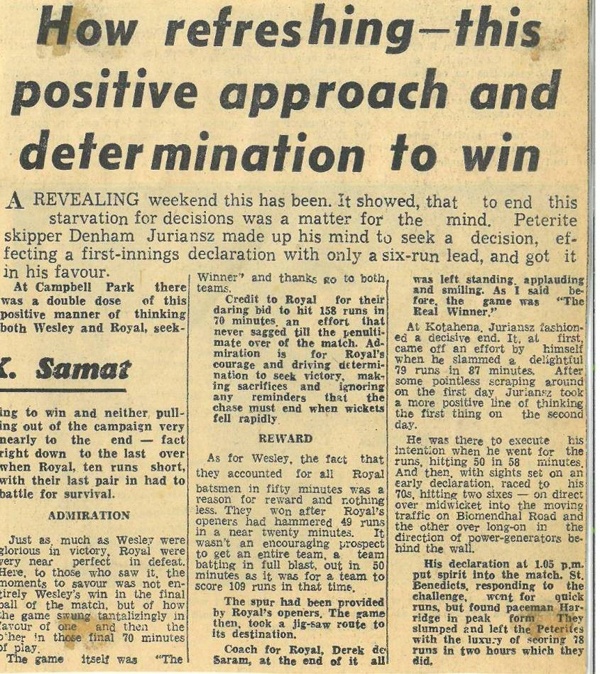
The Royal – Wesley encounter took place at Campbell Park on the 21st and 22nd of February 1969. So far most of the descriptions of the game have been mostly from a Wesley perspective, quite often interpreting the game with the benefit of hindsight and, to my mind, distorting the true dynamics of what occurred. M.B. Marjan, writing for the Messenger, described the game as “a match for all seasons.” (Refer next page.) He rightly described it as a thriller and used words such as “carnival cricket” in capturing the excitement which prevailed in the last session and gripped the milling crowd. And although he praised the vanquished, citing Grantland Rice, he made it appear that it was only Wesley that had taken the risks and opened the game up. He quoted the well-known saying “fortune favours the brave”, the brave in this instance being Wesley.
The problem with using clichés is that one ends up validating the cliché by interpreting events in a particular way. Because Wesley won, they are anointed with the halo of bravery. Eleven runs stood between Royal and a similar accolade.
TMK Samat (see above) was much closer to the point when he said, to quote –
“Just as much as Wesley were glorious in victory, Royal were near perfect in defeat. … Admiration is for Royal’s courage and driving determination to seek victory, making sacrifices and ignoring any reminders that the chase must end when wickets fall quickly”
This article is an attempt to correct a bias by presenting the game from Royal’s point of view and build on Samat’s panegyrics. It will be argued that Royal were much more than just good losers.
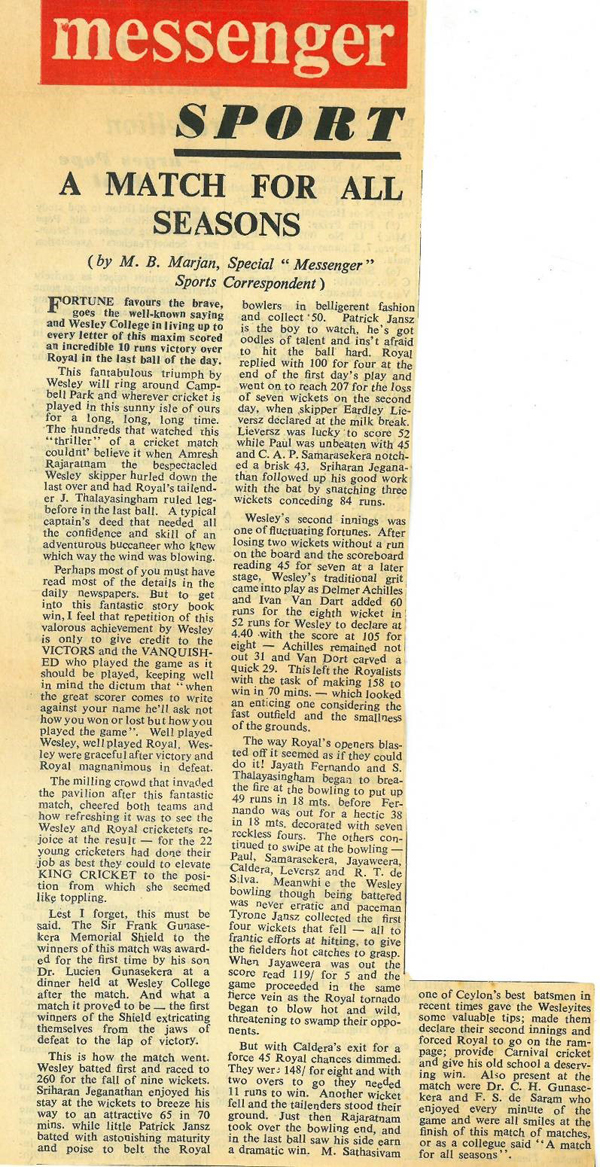
Royal were in fact instrumental in setting the game up for a tight finish through a gallant fight back, first with the bat, then with the ball, and again with the bat, led by Jagath Fernando, Dhayan Caldera and Asita Jayaweera.
The need to develop momentum
I was painfully aware that Royal needed to develop momentum going into the Royal Thomian, which was two weeks away. We had chased leather against St Peter’s whose batsmen toyed with our attack in both innings. I was desperate to win the toss and give our powerful batting line-up the best chance of expressing themselves, rather than being under pressure after conceding a big total.
Interestingly, the press criticised St. Peter’s for not being more adventurous because they totally dominated the game against us. I would gladly have exchanged places with St. Peters’ and copped calumny if it meant that we could have taken charge of matches. But clearly the press was less forgiving of sides that refused to take risks than they were of sides that failed to play to their full potential.[1] The press seemed impatient for bold decision-making and excitement. No one knew then that their hopes would be realised sooner than they thought.
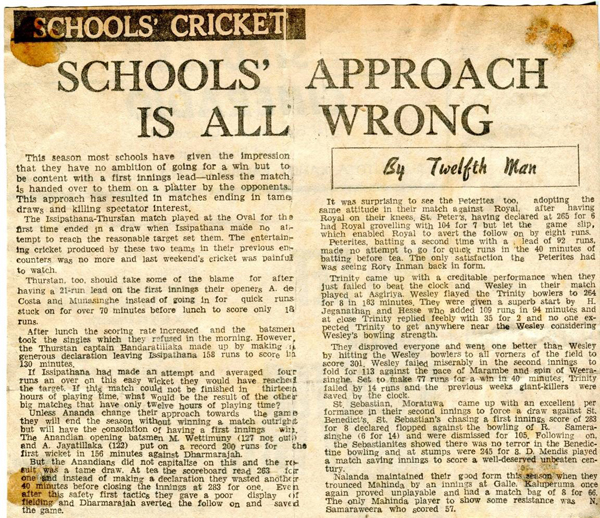
[1] I have to admit that I was partly to blame for St. Peter’s attitude due to my failure to declare immediately upon averting the follow on. I was planning to do so but changed my mind when Gamini Salgadu approached me and said in a patronising tone “Well Lieversz, I presume you will be declaring?” I said no simply to prove that I had a mind of my own. At milk on the second day of the Wesley match, Salgado asked me what my plans were, and I said that I was declaring because he was less presumptuous than usual, that I was declaring.
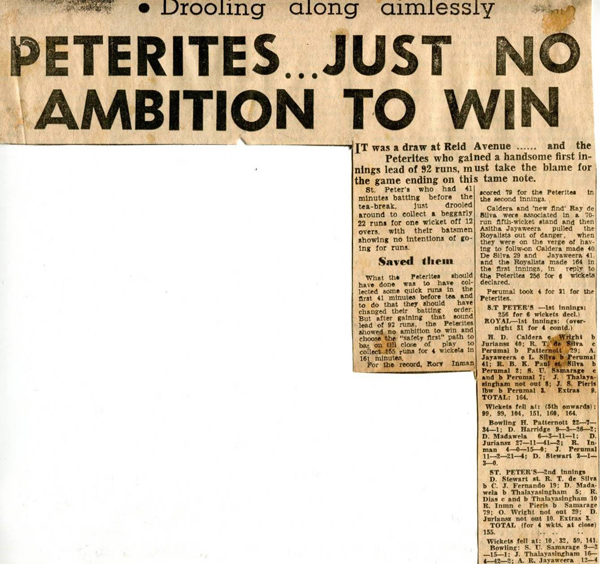
Despite Royal’s poor showing against St. Peter’s the press took the view that Royal and Wesley were evenly matched. Amidst the usual spiel about how so and so needed to show better form, and the danger players on either side, and a nonsensical comment about me batting at first wicket down[1], one writer did stress the importance of a win for Royal going in to the Royal– Thomian. This thought was on my mind, too. Ideally, we needed to notch up wins in the two remaining games.
[1] There has always been a difference in quality between pre-match reporting and the description of a match following its completion, and the Wesley game is a perfect example. The articles prior to the game seem to have been rushed to meet a deadline and to provide space-filling copy. The articles which appeared after the game were, by contrast, highly nuanced and analytical, at times touching on the philosophical. It is always easier to write about what has happened than to say what should or could be. Hence, as the game progressed, the press clippings moved from the pedestrian and cursory to the sublime.
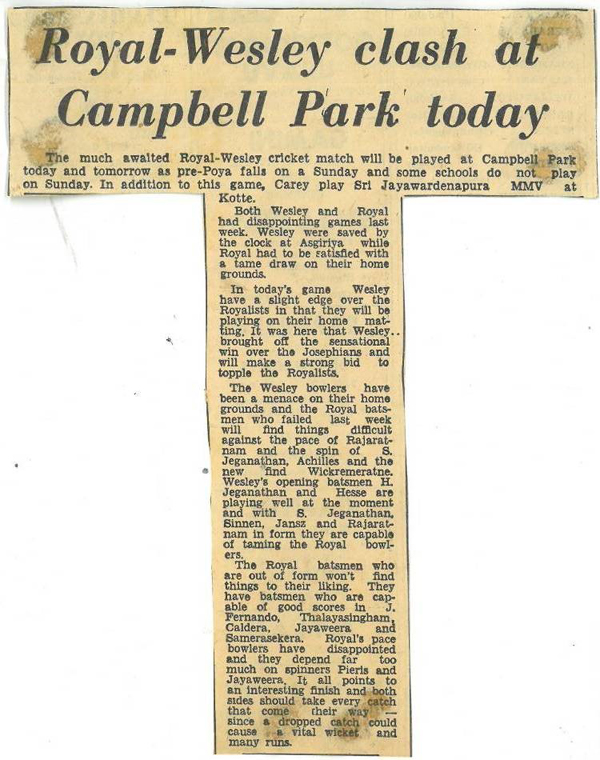
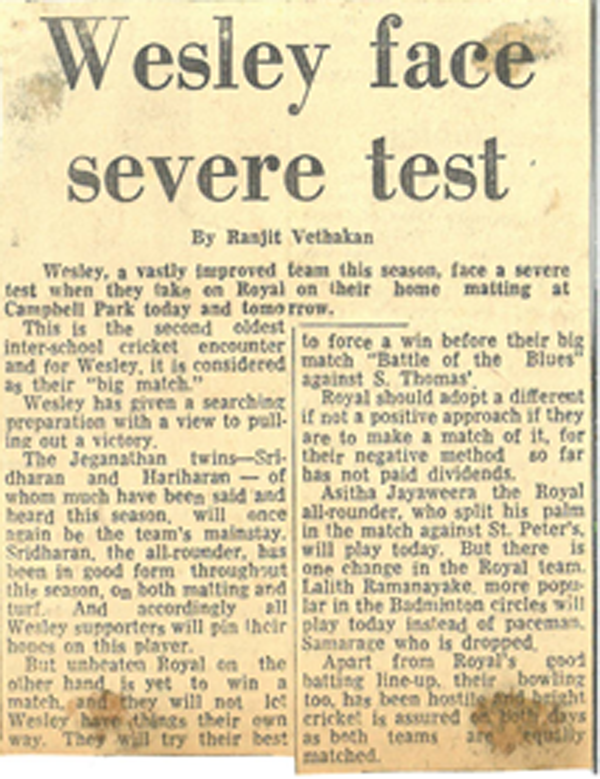
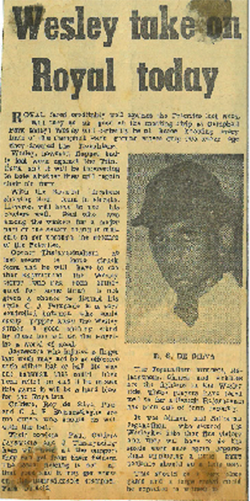

Telling bowling and batting statistics
Both our bowlers and batsmen struggled against St. Peters’ innings and we just managed to avert the follow on. In the week following, the master in charge turned up to practice with a set of bowling and batting statistics which had been compiled by students of one of his classes. He hypothesised on how much better it would be if the bowlers and batsmen exchanged averages. I took all of this personally because I believed that, as captain, I was the one responsible for our poor showing.
We had come off worse in the previous two games. We did battle gallantly against Nalanda and saved the game against the odds, and we worked hard to save the follow on against St. Peter’s. But I preferred to bat first and so did the bowlers. I found it easier to bring the best out of bowlers and put pressure on the batsman with a total behind me. Winning matches counted more than successful back to the wall struggles at this stage of the season.
A disappointing day on the field
Any hope that I could turn things around evaporated when I lost the toss to Wesley and I found it near impossible to stop the flow of runs on the tiny ground at Campbell Park. After Wesley declared we ended the day facing the follow on for the second successive game.
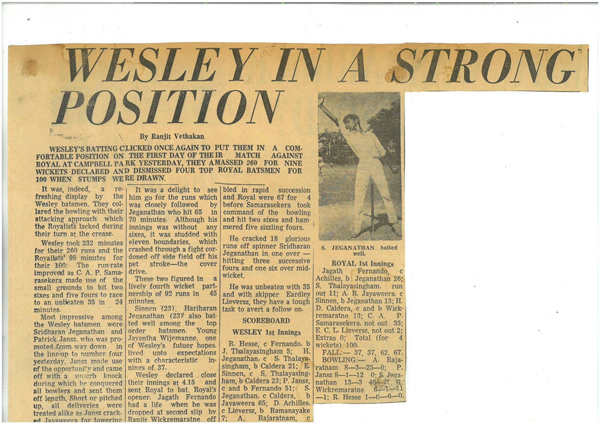
I was at my wits’ end trying to curb the run rate on a rectangular shaped ground with a fast and uneven outfield. I felt like a hapless soul who had no control over events. It was my worst ever four hours as a captain, and I felt that I had let my team and my school down. I had never felt less proud of being Royal’s captain. By the tea break my confidence was shot and I lacked self-belief. Where I had been hopeful than we could finally turn around our woeful form, things had only gotten worse.
Wesley declared at 260 for 9 and we replied with 100 for four wickets with me going in at the fall of the fourth wicket at 67. We had failed with the ball and then had failed with the bat. C.A.P. Samerasekera was the only bright note for Royal with an aggressive 35 not out, which included two sixes and five fours, and in which he demonstrated an ability to give Wesley more than a taste of their own medicine.
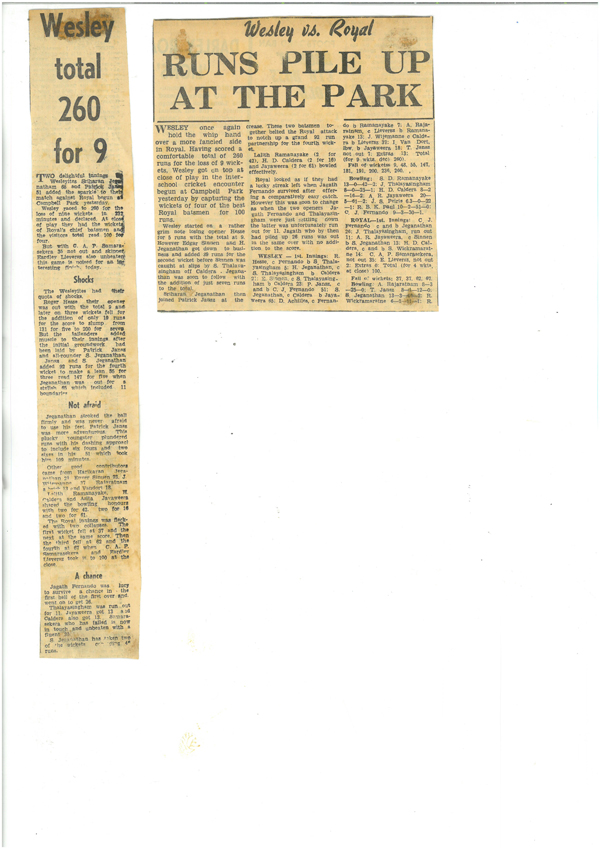
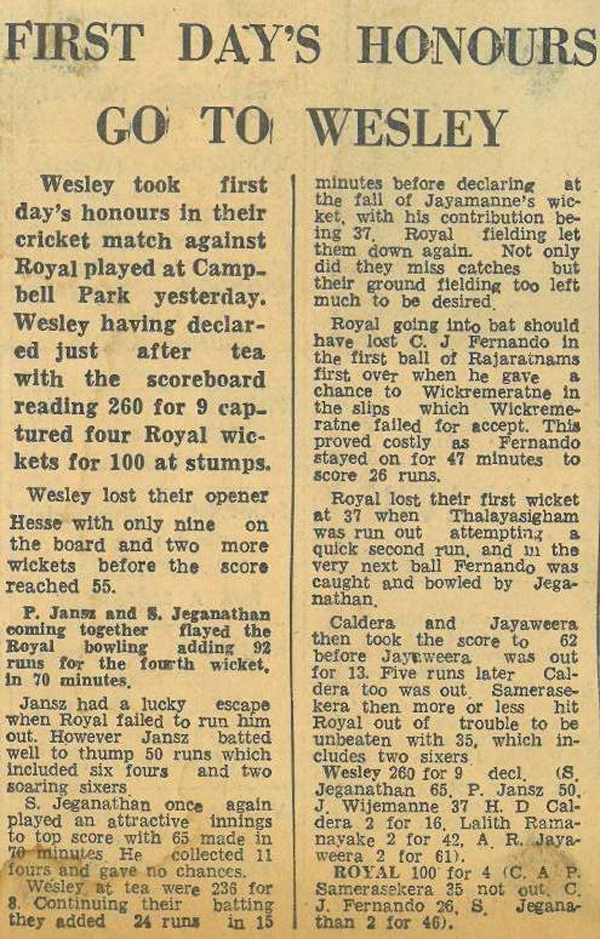
I had played sheet anchor while Samerasekera batted in a manner that made me believe that if another half an hour’s play was possible, we could avert that follow on that evening. And I was glad that I hadn’t lost my wicket, because another failure with the bat would not only have had Royal in dire straits but would also have contributed immensely to my eroding self confidence. I was fast becoming a captain only in name only.
While St. Peters’ had declared their first innings at 256 for 6 wickets we had done marginally better against Wesley on a smaller ground. And whereas I had carelessly thrown away my wicket against St. Peter’s, I was still undefeated at the close. And whereas we ended the first day against St. Peters’ requiring 125 runs to avert the follow on, only 60 runs were required on the second day in order to achieve a similar goal against Wesley. But this was of scant consolation to me. For the second match in succession we had conceded over 250 runs and were facing the follow on. And the Royal Thomian was getting closer.
I used to obtain perverse delight from press reports of the big totals made against the Thomians. But now I clearly understood the angst my Thomian counterpart had been subjected to. His shadenfreude at our plight would have been justified. TMK Samat’s headline said it all. We had been well and truly clobbered and, as a result, I was totally gutted.
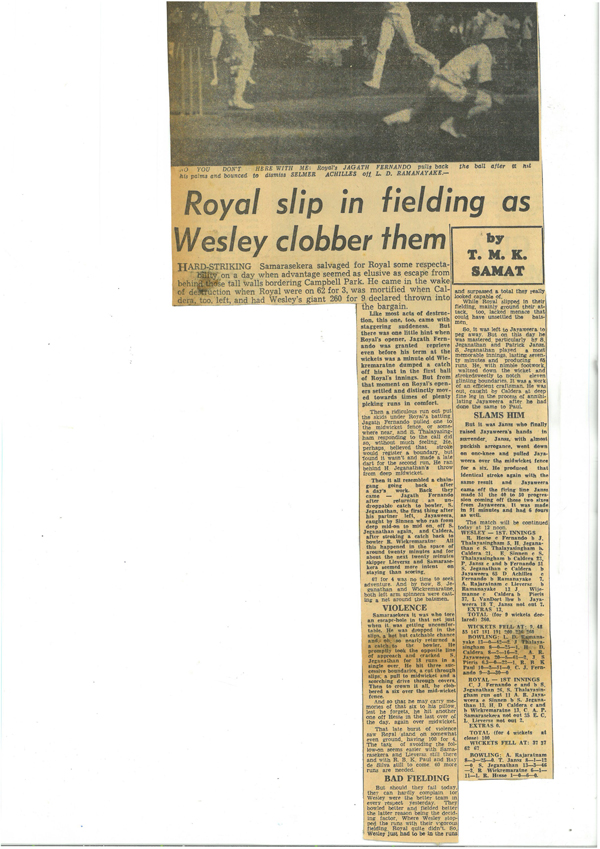
Losing faith in myself
I was extremely depressed and dejected that evening. I had run out of ideas and things had deteriorated even further just when I had thought that our fortunes would improve. Looking back, my worst period as captain was from the first day of the Peterite game and the first day of the Wesley game, after fielding first on both occasions. This was when my confidence was ebbing away and I felt that I had let the school down.
Although Wesley lost their first three wickets with 56 runs on the board my optimism proved premature. Jansz (51) amd S. Jeganathan (65) piled on the runs. And when I had hoped to wrap up the Wesley innings at the fall of the seventh wicket at 200, their tail had wagged.
My father came up to me at home and, while acknowledging that I hated to be given advice, suggested that I was handling my bowlers too mechanically. I was in such a state of despair that I was prepared to listen for the first time that season. But I didn’t sleep well that night.
The beginning of the second day
If a soothsayer had told me at the start of play on the second day that we would lose the game, I would have interpreted this to mean that we would be asked to follow on. If he/she predicted a second innings Wesley collapse, I would have questioned his/her sanity. If the soothsayer went on to predict a win in the Royal – Thomian and everlasting fame I would have asked for my money back. At the start of the day, all I hoped for was to avert the follow on and bat out our second innings.
The team met at the school office prior to departing for Borella and was addressed by Gamini Salgado. He held forth on what we needed to do to get back into the game but his actual comments escape me. What was significant was that he addressed the team and totally ignored me as if I no longer mattered and could no longer make a difference. Being marginalised exacerbated my pessimistic mood but, in a perverse sort of way, made me determined to make my mark.
I needed Samerasekera to continue from where he had left off the previous evening. He scored eight of the first nine runs of the morning before he departed for 43. This was not what I was hoping for and I was in a state of total despair. It seemed that that my worst nightmare was about to come true.
The fightback
Beverley Paul joined me and we survived some tense moments. We were crowded and I remember silly mid off being so close that I popped a catch over his head. I was in a daze and felt that I would go any moment, but I was determined not to surrender my wicket cheaply.
We fought our way out of trouble and gradually, as the momentum swung in our favour, Wesley began to feel frustration. The worst-case scenario they may have envisaged was for us to narrowly avert the follow on, for them to consolidate a lead of about 90 by piling on the runs with a view to declaring before tea. But we put on 95 runs for the sixth wicket before I got out caught at deep mid on, attempting to pursue quick runs prior to a declaration at the milk break. We conceded a lead of 53 runs. We had shown that we were no pushovers and that we had spunk.
At this juncture it is important to discuss the two first innings declarations because the scribes attributed the great finish to the three declarations, two of them by Wesley. And because Wesley declared twice, they concluded that Wesley had taken more risks, and were more decisive, than Royal.
Wesley declared their first innings at the fall of the ninth wicket when the innings was all but over. They batted after tea in order to put themselves in an unassailable position, in the hope of enforcing the follow on. We declared with 7 wickets down with Paul at the crease with 45 runs to his account and J. Thalayasingam, who was a capable batsman, with him. I will discuss Wesley’s second innings declaration in detail later.
If Royal had followed on there might have been a tense finish, but not in the way it did eventuate, with both sides having a chance of victory. Wesley would have striven to dismiss us cheaply for a second time, and the best that Royal could have hoped for was to save the game.
Wesley on the back foot
Having to bat again Wesley would have intended to pile on the runs and declare a little after tea. But even if they were able to score quickly, they still would have lacked sufficient time to dismiss Royal under normal conditions. Their confidence had been dented after a frustrating stint in the field on the morning of the second day when they had only managed to capture three wickets. (Royal scored 165 runs losing those three wickets.) They may therefore not have fancied their chances of dismissing Royal in one session.
Wesley’s batting in the second innings was in stark contrast to what it had been in in the first, and she lost 7 wickets for a mere 45 runs. I felt like a man who had won lotto after being evicted from his home following mortgage stress.
Royal’s Achilles heel
I was expecting Wesley to recover from losing early wickets. But capturing three wickets with the score at 17 and another at 34, thanks to the efforts of our pacemen and fielders, was mind-boggling. And when their seventh wicket fell and the dismissed included the opener H. Jeganathan (24) who was run out, I felt that the momentum had irrevocably turned in our favour.
A little while after, a sitter was dropped off J. Thalayasingam, which, if taken, would have exposed the tail. The consensus of opinion is that the dropped catch cost Royal the match. The fortunate batsmen was Achilles (39 n.o.), who subsequently featured in a sixty-run partnership. If Achilles had departed with the Wesley total in the mid fifties, it is probable that Royal would have dismissed Wesley for under 70 runs and chased a target of about 120 at the most, in even time. But then again, in a match where the natural course of things had been stood on its head, there is no certainty that Royal would have knocked off the runs with ease. Often, chasing a small target with sufficient time to do so, can generate unique pressures.
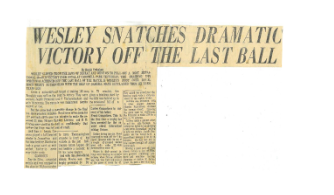
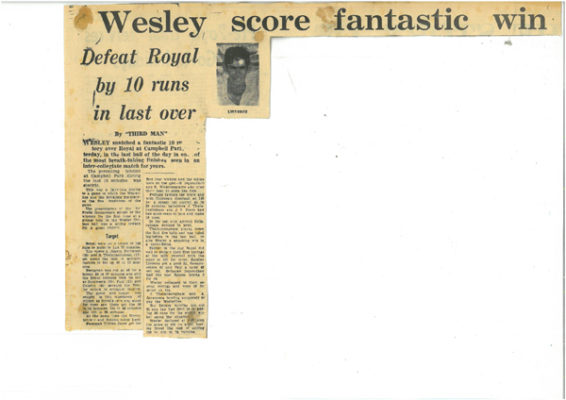
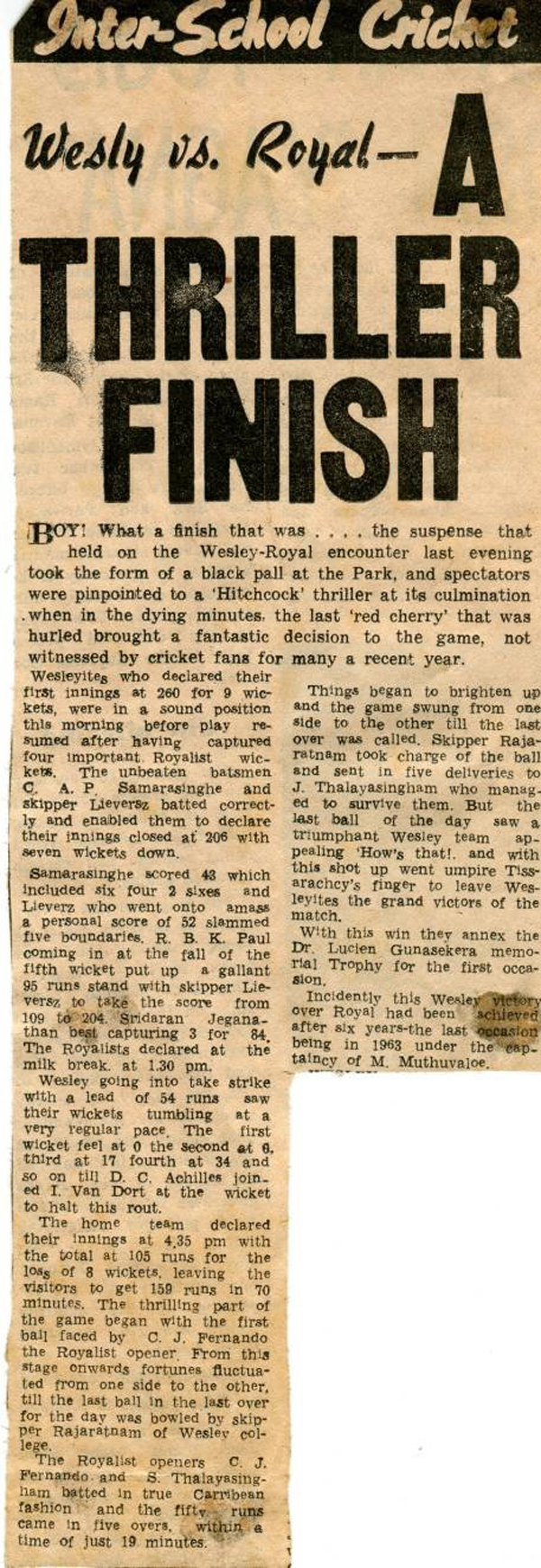
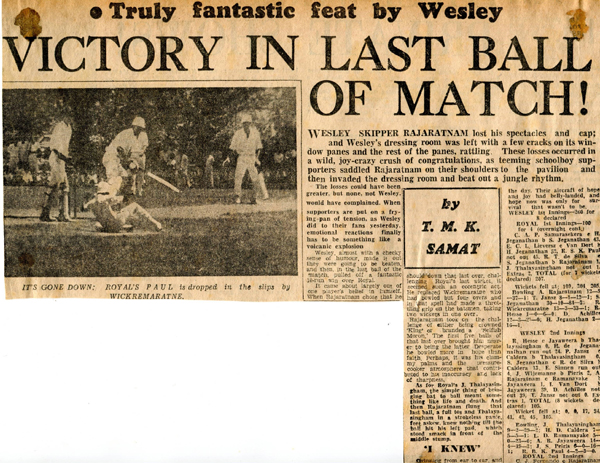
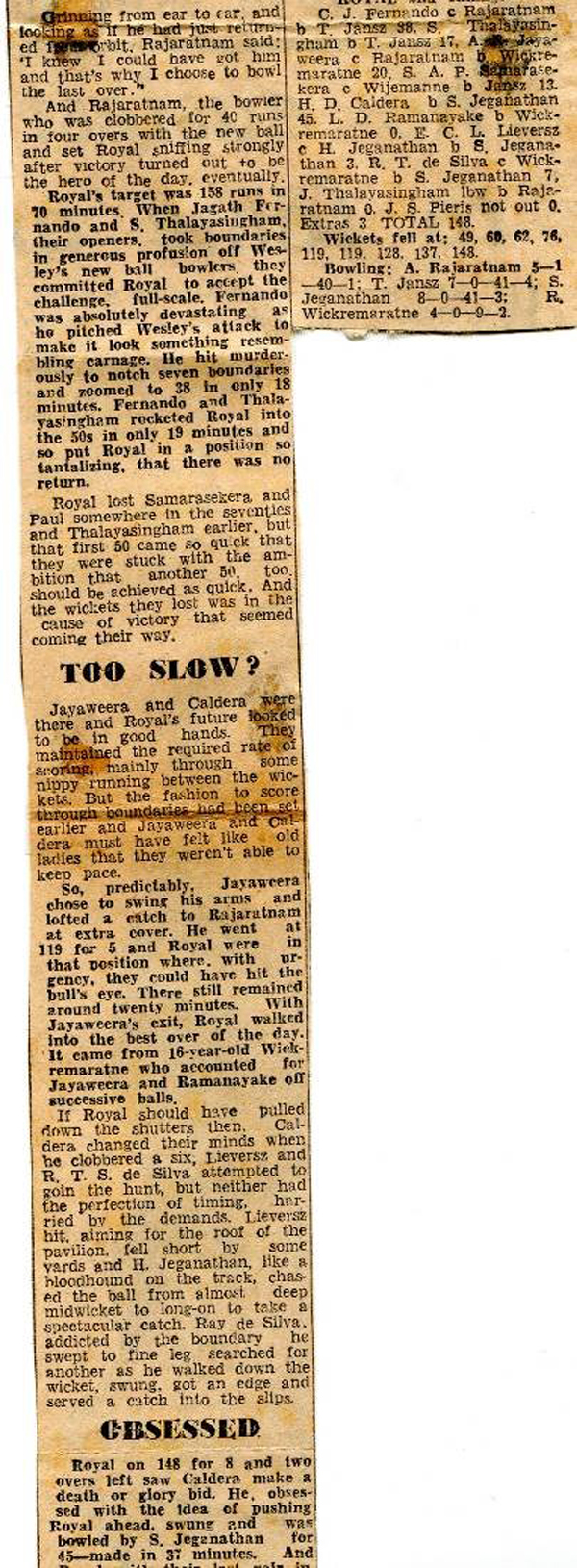
Royal’s contribution underestimated
Although an eighth wicket partnership doubled that score, it was the initial breakthrough by Royal’s bowlers which set up the exciting finish, in a manner that Wesley could never have envisaged. Ironically, by losing control of the game, Wesley improved her chances of winning. And by doing well in the field Royal increased their chances of losing, because when a side looks like winning and is then stalled, it takes risks to achieve the win which looked to be there for the taking. We averted the follow on with a staunch display of batsmanship, then our bowlers tightened the screws on the Wesley batsman, and we finally accepted a challenge which most teams would have avoided. In other words, Wesley won because we were hungry for success at any cost and we never wavered, although we had to fight back from a losing situation at the commencement of play.
The press claimed that Wesley wrenched victory from the jaws of defeat, when in fact it was Royal that had made all the bold moves, despite starting the day facing the follow on and a likely defeat. Due to the fairy tale finish, the Wesleyites and the press tailored the story to match the ending, thus propagating the myth of a precise and finely tuned decision, which enabled Wesley to obtain victory off the last ball of the game.
A hair-splitting declaration?
The article titled “A hair-splitting declaration” written by Edmund Dissanayake, the master in charge of cricket at Wesley in 1969, first appeared in the Island of 13th October 1989. It reappeared in same paper on 29th December 2005.
In it the writer articulates the exchanges between him and ex Sri Lankan cricket captain M. Sathasivam on the timing of the Wesley declaration. The article ends with a reproduction of the article by Marjan to which reference has already been made. The reproduction of Marjan’s match summary differs slightly from the original due to subsequent editing. The author died tragically in a drowning accident in the mid-seventies and, out of respect, I feel obliged to present his review in its pristine form right at the beginning of this article.
Neither of the writers of the mentioned links to Wesley are likely to still be around, and therefore cannot defend themselves. I respect that, but the reasons given by the Island for reproducing the article by Edmund Dissanayake in 2005 must surely provide a tinge of pride to all those involved with the match, either as player, official or spectator. It states –
We reproduce this article which was published in “The Island” of Friday 13th Oct. 1989 for the following reasons. Today, school cricket has lost its former interest, mainly because schools are concerned only with a first innings lead.
The reason for this is that points are awarded for a first innings lead. Trophies are decided likewise. Schools play for trophies mainly. The result of the Royal-Wesley match played in 1969 was decided on the last ball of the match.
There were three declarations to produce this result”
| A hair-splitting declaration… and Wesley beat Royal, last ball by Edmund Dissanayake Many factors have to be carefully considered before a captain decides to declare his innings closed in the second innings — the strength of his bowlers, the batting depth of the opponents, the target to be set, the time factor, the state of the wicket, the size of the ground, whether fast or slow and the weather are among these factors, which however are not exhaustive. For example, a target of 150 runs at Campbell Park may be a possibility, but no necessarily so on the adjoining Campbell Place Ground. Much has been written a various times about the hair-splitting declaration by Wesley in 1969, when Royal were set a target of 159 for victory in 70 minutes of batting, at Campbell Park… and Wesley emerged victorious in the very last ball of the match! I crave the indulgence of readers, if I were to strike a personal note in this article, because I was the honorary cricket coach of this victorious Wesley team of 1969 skippered by Amaresh Rajaratnam. The animated, hush-hush conversation that took place in the Wesley dressing room between two people on that day, is being published for the first time today. The other person was none other than the mercurial M. Sathasivam, a former Wesley cricketer, the first person in the world to have skippered two countries at cricket. It was my wish to advise the Wesley captain to declare five minutes earlier than he actually did. I was in consultation with Satha and I told him that our bowlers must have sufficient time to get the Royalists out…if sufficient time is not given, they may not go for the runs. Maestro Satha, cautioned me thus, “My dear fellow, if you give one extra over, Jagath Fernando will whack you. I saw him last week. I know him well.” I bowed to Satha’s mature wisdom. As it proved later Satha was right… he is seldom wrong! Had Wesley declared five minutes earlier, Royal may have won the match. Had Wesley declared five minutes later, the match may have ended in a draw. But that hair-splitting declaration as advised by the world’s most stylish batsman, proved a thriller that even Alfred Hitchcock could not have enacted. It is of interest to record that this match commenced each day at 12 noon, included a milk interval of 10 minutes, and stumps were drawn at 6 p.m. with no provision for mandatory overs. Certainly, the playing time was very much less than today…and yet a victory was possible. That was because both the Royal and the Wesley captain at the very outset, were determined to make a match of it. Hence, there were three declarations. And to continue with the match, I can do no better than to refer you to M. B. Marjan who recounted the agony and the ecstasy that prevailed on that day, as reported in the ‘Messenger’ of Sunday 2nd March 1969 under the captivating title “A Match For All Seasons”. “Fortune favours the brave, and Wesley College in living up to every letter of this maxim scored an incredible 10 runs victory over Royal in the last ball of the day. This fabulous triumph by Wesley will ring around Campbell Park and wherever cricket is played in this sunny isle of ours for a long, long, long time. The hundreds that watched this “thriller” of a cricket match couldn’t believe it when Amaresh Rajaratnam, the bespectacled Wesley skipper hurled down the last over and had Royal’s tailender, J. Thalaysingham ruled leg-before in the last ball. To get into this fantastic story book win, I feel that repetition of this valorous achievement by Wesley is only to give credit to the victors and the vanquished who played the game as it should be played, keeping well in mind the dictum that “when the great scorer comes to write against your name, he’ll ask not how you won or lost but how you played the game.” Well played Wesley, Well played Royal. Wesley were graceful after victory and Royal magnanimous in defeat. The milling crowd that invaded the pavilion after this fantastic match, cheered both teams and how refreshing it was to see the Wesley an Royal cricketers rejoice at the result — for the 22 young cricketers had done their job as best they could to elevate ‘King Cricket’ to the position from which she seemed like toppling. What a match it proved to be… the first winners of the Sir Frank Gunasekera Memorial Sheild extricating themselves from the jaws of defeat to the lap of victory. Wesley batting first amassed 260 for 9 declared, towards which Hariharan Jeganathan contributed 21, Sinnen 23, Jayantha Wijemanne 37, Patrick Jansz 51 and Sritharan Jeganathan 65. At the end of the first day, Royal had scored 100 for 4. Royal skipper Eardley Lieversz batted with determination to knock up 52, Paul was not out 45. C. A. P. Samarasekera notched a quick 43 when the Royal declaration was made at the milk break at 207 for 7 wickets. Sritharan Jeganathan captured 3 for 84. Wesley suffered a rude shock in their second innings losing the first two batsmen without any score. They were in real trouble when the scoreboard read 45 for 7 and with plenty of time, a Royal victory seemed imminent. But Wesley’s traditional grit came into play. Delmer Achilles not out 31 and Ivan Vandort 29, added 60 runs for the eight wicket, enabling Wesley to declare at 105 for 8. Royal was set the target of scoring 159 for victory in 70 minutes. This was an enticement to the Royal batsmen, considering the smallness of the ground and the very fast outfield. Royal sportingly accepted the challenge. Royal’s openers Jagath Fernando and S. Thalayasingham belted the Wesley bowlers to all corners of the field. Jagath was out for a hectic 38, which included seven hits to the ropes. The batsmen who followed continued to swipe at the bowling… Paul Samarasekera, Jayaweera, Caldera, Lieversz and R. T. de Silva.
The hundred came up in forty minutes at 5.35 p.m. Royal had to score 40 runs for victory with six wickets intact. Definitely, the game had swung in Royal’s favour. Lieversz was out to a spectacular running catch at long on, a few inches from the boundary line, by Hariharan Jeganathan. Wesley turned on the pressure. With 15 minutes left for play, Royal had to score 20 runs with 4 wickets in hand Royal lost their 9th wicket in the penultimate over with the score at 148. Now the last over for the day was to be bowled. Rohan Wickremaratne, who had captured two wickets, was replaced. The skipper himself came on from the Baseline Road end. The batsman played down the first few balls. The last ball was a full toss, dead on the stumps. The batsman did not offer a stroke, and the ball rapped his pads as he stood flat-footed, right in front of the wicket. The umpire did not hesitate to raise his finger. Caldera’s exit when he was on 45 sealed Royal’s chances of victory. For the winners, Tyronne Jansz bowled with gusto to capture 4 for 47 and Sritharan Jega 3 for 84. Wesley were worthy winners and Royal gallant losers.
|
A curious spin
The conversation has Sathasivam advising the master in charge to delay the declaration by 5 minutes because of Fernando’s batting prowess, which Sathasivam had witnessed the previous week. In the unlikely event that Sathasivam actually attended the game at Reid Avenue, he would have observed that Fernando failed against St. Peter’s. And why wasn’t Samerasekera’s batting also taken into consideration, given his swashbuckling batting persona, which was so evident on day one at Campbell Park? If Fernando had failed with the bat, he would not have been part of an invented conversation. If Samerasekera had replicated his first innings effort he would probably have loomed large retrospectively in Wesleyian strategy.
To score at double a run a minute (159 runs in 70 minutes) was more than enough to protect a fielding side in normal circumstances. Even a slightly softer target of say 150 in 75 minutes would still have been extremely formidable. My response to a query made by assistant coach Gamini Salgado was that we should give it a go and see what happened. I would have said the same if Wesley had declared five minutes later than they did. The fact was that I didn’t think it possible that we could lose. However, I couldn’t account for freak incidents.
In cricket, decisions cannot be made with the precision of a computer-generated model. Human frailties militate against this. One cannot calculate a decision in order to obtain a result on the last ball of a match. As it happened Royal’s No. 10 padded a full toss, which is unlikely to have been delivered intentionally. This makes the ending quite fortuitous.
There are two main considerations when setting a target. You either make sure that you cannot lose at the risk of not having sufficient time to win, or you give yourself time to dismiss your opponents and open the game up a little. Under normal circumstances a side cannot be dismissed in 70 minutes however tempting the target. One can go hell for leather and then pull up shutters during the final overs, if required. It took an unintentional full toss, which was then padded to create a result. This was more chance than contrivance, more coincidence than a finely crafted ploy.
One must therefore conclude that Wesley made a token declaration to reciprocate Royal’s decision to declare and concede a lead. But Wesley protected their interests by setting a near impossible target. The declaration was based more on a safety-first principle than a bold risk strategy. It was far from a finely calibrated decision in which deliveries, runs, time and the size of the ground were mentally processed to arrive at a declaration time. The explanation is far more prosaic.
Wesley was probably hoping to get an early breakthrough, convert the game into a stalemate and make it drift towards a predictable draw. But there was no turning back from Royal’s hectic start because, within a 70-minute period, there is no room to pause and consolidate, and to convey solid advice to the batsmen in the middle. I felt like I was hurtling through intergalactic space with no concept of time. And as Samat observed – the fashion to score through fours had been established by Fernando who hit up 38 in 18 minutes. (If in 1962, Royal chasing a Thomian target of a little over a run a minute made the mistake of trying to score the bulk of their runs through boundaries, the Royal team of 1969 couldn’t be faulted for thinking along the same lines.)
Wesley hadn’t provided loose balls to Royal’s openers in order to lure the entire batting line up into a trap. On the contrary, when Fernando was at the crease, Wesley fast bowler Jansz deliberately extended his run up in order to slow down the over rate.
It was not Wesley but Royal, particularly Fernando and those who followed in his wake, by raising everyone’s expectations, and then stretching every sinew to fulfill those expectations, that had made Wesley’s declaration appear finely tuned. We tend to downplay Caldera’s efforts with the bat in the latter stages of the game, which was a true “boy stood on the burning deck” effort, which took the game down to the wire, and set the stage for Rajaratnam’s much lauded last ball “heroics”.
Whatever Fernando’s motivation may have been – he once conceded that he was desperate to redeem himself after dropping a sitter – his batting “big bang” turned the entire Royal team into heroes, for we all felt morally obliged to ensure that his effort wasn’t in vain. He is truly the unsung hero of a memorable match, which had, and still has, everyone talking.
After the result Wesley made it appear that their brains trust set Royal a tempting target and
were counting on Royal’s rashness to convert 70 minutes into a space sufficient for capturing ten wickets. While giving Wesley credit for not panicking and taking some good catches during Royal’s onslaught, and to Wesley’s captain for organising his team well under pressure, the evidence doesn’t support a profoundly considered strategic decision. Curiously, the Wesley captain is not mentioned as providing input into the discussions. This is another reason why I feel that the conversation cited in Dissanayake’s article is fictional.
If Dissanayake’s explanation is accepted, the Wesley captain could very well argue that his full toss was an attempt to blindside the batsman by the trees in the background. But this would beg the question. If the delivery was so deceptive, why did he wait until the last ball to deliver it?
A Royal defeat was obligatory
- Thalayasingam had sensibly negotiated the first five deliveries of the last over. If Rajaratnam had delivered a good length delivery to end the game, it is most likely that the game would have been drawn and I wouldn’t have bothered to write this article. But the accidental full toss caused the game to go into history. A “nail biting draw” could never match “a victory off the last ball” in grabbing the headlines and immortalising the match.
Eleven runs stood between Royal and victory. Had Royal had prevailed, the winning run would have had to have been scored in the last ball for the match to have acquired the near mystical status the game it has achieved. But even then, because Royal didn’t make the declaration, the aura attached to the victor successfully backing itself after making a “bold” declaration would not have been applicable.
Given the circumstances of the game, a Royal defeat was the only way in which the match could now be held as an example to the current generation on how to play cricket in the right spirit. To lose, but to do so honourably, and to be remembered and respected after all these years, makes defeat more than palatable.
How many school cricket games outside the big match are remembered after such a long time? And the more one reads the press clippings, the more it appears that the press were mesmerised in a manner rarely seen before or after. The journalists who were in attendance at Campbell Park were virtually drooling.
At the time I would have preferred to have beaten Wesley on our own terms, by dismissing them in their second innings and subsequently knocking off the required runs. The headlines would have read along the following lines – “Royal come from behind to register a sensational win” or “After being on the back foot for most of the game, Royal win convincingly” or “Royal in great fightback”. And we came very close to generating those headlines. But the game would never have gone into history as it has after the game was decided on the last ball.
Self-belief restored
More importantly, Royal felt comfortable taking risks, which would hold it in good stead at the Royal-Thomian. While my heart sank when Samerasekera was dismissed early, my fifty restored my self-belief and I led my team out with a reconstituted psyche. Unlike in the first innings, every move obtained immediate results and Wesley wickets fell at regular intervals with the flow of runs contained. Although we lost the game we did so with honour and I recovered my self-respect. I had now acquired credibility, which would hold me in good stead when it came to making bold and unpopular decisions, off the field as much as on it.
At the start of the second day I was a desperate man in search of a lifeline. While the omens were not good, a succession of fortuitous events presented themselves like manna from heaven. I grabbed them the way a man in a parched desert gulps water.
We saved the follow on, I scored my first and only fifty for the season, and Wesley collapsed in their second innings. My boldness and penchant for risk taking came to the fore. I declared behind Wesley’s total when I had never quite expected to be in a position to declare at all. And unlike the first innings our bowlers (and fielders) drove a stake into the Wesley batting. I felt that I had restored my honour and become a captain worthy of my school and my gifted team. Going for a target at the risk of losing was no big deal after what I had been through. I didn’t achieve the victory I was after but received something better – a moral victory.
The great leveler
What a great leveler cricket is as it showcases its glorious uncertainties. Just when you feel that things will get worse before they can get better, the game takes an unexpected course and delivers an outcome as unanticipated as it is unexpected. When our fifth wicket fell early on the second day, I really felt that we would follow on and our performance would hit such a low that the bottom would irretrievably fall off our big match preparations and we would meet the Thomians in a state of total disarray. I feared going down as the worst Royal captain ever, someone who had squandered the wonderful legacy bequeathed by his predecessor. Yet, in defeat, the team and I were ennobled in a manner I couldn’t possibly have conceived at the start of play. It was as if the sins of the season up to that point had been cleansed by our magnanimous defeat – a defeat for which no one castigated us. Better still; I had picked up the art of effective bowling changes, a strategy of rapid and often unpredictable rotation, which had eluded me all season. I was now quietly confident of using the final two games of the season to do justice to the wonderful talent at my disposal. The momentum that had eluded the team all season had finally arrived and I was determined to run with it. I wanted to end a disappointing season with a bang. (I bumped into Wijemanne, a member of the Wesley side, in 1980-81. He was emphatic that Wesley was responsible for Royal’s win in the big match, and didn’t begrudge us our success. We did accumulate a lot of goodwill due to our sporting approach, although this was barely acknowledged by my opposite number.)
However, we first had to beat Trinity and take the lessons learnt into the big match. Success still eluded us. We had lost our first game for the season and had yet to win one. But Royal had obtained a victory of the spirit and character, which would be the platform from which bids for statistical victories could be launched.
Colonel’s joy
What I found most gratifying was the attitude of Royal’s coach, Colonel F.C. de Saram. He was overjoyed and celebrated the match, if not our defeat. It wasn’t so long ago that he had threatened to resign from the position of coach. But now he seemed happy being coach of a team that played the game in the right spirit. We had shown a fighting spirit and a willingness to throw caution to the wind in the pursuit of glory. He seemed to have developed pride in the team and confidence in my ability to release the team’s potential. He was positively beaming when he stood up to say what he described as “a few choice words” at the cricket dinner held at the Wesley College hall.
Royal’s supporters were equally impressed. Tisara Gunasekera, a schoolboy at Royal then, confirms that pride in our effort was so strong that he and his fellow schoolmates sang the school song in front of the pavilion. Subsequently they were jostled by some thugs from Borella, who may have been young old boys of Wesley, for celebrating defeat. The thugs stated in Sinhalese: “Mun match paradellia thavath unge college sinduwa kiynawa”. (Even after losing they are still reciting their college song).
Hit out or get out, rather than disce aut disce de was the theme of that late afternoon. And I, one of Royal’s greatest batting plodders, was carried by the wave. While I was circumspect in my first dig, batting for the second time I threw caution to the wind. I was in the unfamiliar role of trying to win a game rather than save it. It would have been morally unacceptable to do otherwise and play my natural game.
Frank Gunasekera trophy
While the game was on there was no mention of playing for a trophy. But no sooner was the game over when news came through that a trophy had been donated in the name of Frank Gunasekera, and Royal were its first losers. However, the younger members of the Royal team took note of the gloating of the Wesley team, with its captain being the worst offender, and had their revenge by being part of the teams which easily accounted for Wesley in 1970 and 1971.
Eardley Lieversz
Postscript
This is my first foray into writing about my school cricket days in a manner which might appeal to readers who may not follow cricket. At the very least, I want to describe not only the events of half a century ago, but also the manner in which they were covered in the media. And so I work in the numerous press cuttings I have preserved and blend them with what I can recall. Some of the articles, particularly those by TMK Samat still read well, and deserve a new audience. In addition they underwrite a narrative, which attempts to lend a certain mystique to events which took place fifty years ago, by introducing strategical analysis and the morality underpinning decision making. The discerning thoughts, which appear in many of these articles aid a mature rumination and instill a fresh perspective of events which I had understood imperfectly for a long time. The press clippings also instill an archaic and vintage feel to the formatting of the narrative. Finally, the press clippings ground the description in reality and counter any suggestion that the events have been made up.
My only regret is in not taking custody of the scorebook at the end of the season. I truly believed that it was the intellectual property of the school and would be archived and preserved. How wrong I was. It was probably used to wrap gram after being thrown out by the groundsman.








No Comments